- Title
- Vis-NIR bidirectional reflection spectra of spherical water ice particles for different sizes (2 to 100 µm), temperatures (173 and 223 K) and temporal evolutions
- DOI
- 10.26302/SSHADE/EXPERIMENT_OP_20171130_001
- Data reference
- Poch, Olivier; Yoldi, Zuriñe; Jost, Bernhard (2016): Vis-NIR bidirectional reflection spectra of spherical water ice particles for different sizes (2 to 100 µm), temperatures (173 and 223 K) and temporal evolutions. SSHADE/BYPASS+CSS (OSUG Data Center). Dataset/Spectral Data. https://doi.org/10.26302/SSHADE/EXPERIMENT_OP_20171130_001
- Database(s)
- Experimentalists
- Type(s)
- laboratory measurement
- Description
- Three types of water ice particles were prepared, having three grain size distributions: 4.5±2.5 µm, 67±31 μm, and between 2 and 100 µm. Reflectance spectra (from 0.4 to 4 µm) of 5mm-deep surfaces of these particles were measured at 173 K, and some at 223 K, under primary vacuum. During time, the particles undergo metamorphism (recristallisation/sintering, change of grains shape and size) and spectra were measured again several hours after the measurement of the fresh samples.
- Number of spectra
- 9
- Variable type(s)
-
- sample grain size
- temperature
- sample texture
- time
- spectral range
- Comments
- During time, the ice particles undergo metamorphism (recristallisation/sintering, change of grains shape and size) and spectra were measured again several hours after the measurement of the fresh samples.
- Instrument
- SHINE Spectro-Gonio bidirectional reflection Vis-NIR
- Sample holder
- Aluminum sample holder, cylindrical 48 mm diameter and 1 to 5mm depth closed by a sapphire window and cooled by a He cryostat in a vacuum chamber (Carbo-NIR)
- Standard medium
- vacuum
- Observation mode
- spectrum
- Spectral range type(s)
- Vis, NIR
- Valid spectral range(s)
-
Min - Max (${\mu}m$) Sampling (${\mu}m$) Resolution (${\mu}m$) Position accuracy (${\mu}m$) Absorption edge #1 0.7 - 2.02 0.02 0.024 #2 2.02 - 3.98 0.02 0.048 - Filters
-
Type Center/Edge (${\mu}m$) Width (${\mu}m$) Place #1 long-pass filters of the spectro-gonio radiometer
Definition: incidence and emergence angles are positive with origin at nadir, and vary in same direction. Azimuth origin (increasing clockwise) is for i = e (opposition geometry).
- Observation geometry
- bidirectional
- Observation mode
- fixed angles
- Incidence angle
- 0.0°
- Emergence angle
- 30.0°
- Azimuth angle
- 0.0°
- Phase angle
- 30.0°
- Resolution illumination
- 0.1°
- Resolution observation
- 4.1°
Illumination
Observation
- Comments
- partial polarization variable with wavelength (from monochromator grating)
- Observation mode
- single spot
- Spatial resolution
- 20.0 $mm$
- Date begin - end
- 2016-10-20 - 2016-10-25
Versions
- Release date
- 2018-01-31 23:51:01+0000 UTC
- Version (Date)
- #1 (2018-01-31 23:51:01+0000 UTC, Updated: 2019-12-21 09:42:04+0000 UTC)
- Sponsors
-
- European Commission - Horizon 2020-RI (EC-H2020) (EPN2020-RI: Europlanet 2020 Research Infrastructure, grant No 654208 (TA2/DPSF/CSS/16-EPN2-026))
